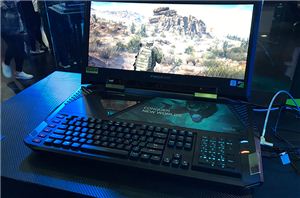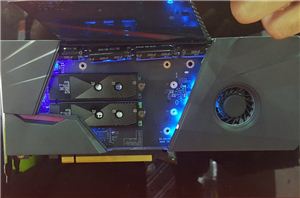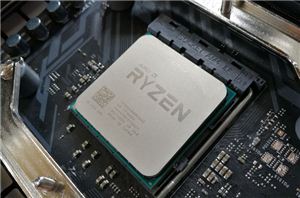New Realtek PCIe 3.0 x4 NVMe Controllers: RTS5762 & RTS5763DL up to 3.5 GB/s
by Anton Shilov on June 25, 2018 12:00 PM EST
The market of SSDs is expanding rather rapidly, which encourages new companies to enter the scene. Realtek introduced its first SSD controller two years ago targeting primarily entry-level PCIe drives. This controller has received a lukewarm welcome from makers of SSDs, which was not a surprise as the market is quite packed. As a result, the company changed strategy and its new RTS5762 and RTS5763DL controllers that are aimed at higher-performance models. Realtek demonstrated both products at Computex.
The RTS5762: 'Worldwide Fastest Client PCIe M.2 SSD Controller'
The Realtek RTS5762 will be the company’s flagship controller designed for high-end SSDs. This chip is NVMe 1.3 compliant, features 8 flash channels and supports various types of 3D TLC and 3D QLC NAND flash memory, thus featuring robust LDPC-based ECC methods to ensure proper endurance for SSDs. Realtek does not want to disclose all the details about the RTS5762 and the RTS5763DL controllers just now, but one of the representatives for the company in its booth said that the said chips support up to 150 bits/1 KB ECC. Meanwhile, when asked about processing cores the controllers feature, the rep said that the company uses its own custom cores without elaborating.
When it comes to performance, Realtek says that SSDs powered by the RTS5762 will deliver up to 3500 MB/s sequential read speeds as well as up to 3000 MB/s write speeds. To put it into perspective, Samsung’s flagship 970 PRO drive offers up to 3500 MB/s reads and up to 2700 MB/s writes (when pseudoSLC caching is used), based on official numbers (for real world numbers check out our review). It is unclear what kind of memory Realtek used to hit its targets, but at the show the company demonstrated an RTS5762-powered drive featuring Toshiba’s BICS3 64-layer 3D TLC NAND.
The RTS5763DL: The New Mainstream SSD Controller from Realtek
In addition to the high-end controller, Realtek plans to offer a cheaper RTS5763DL controller aimed at lower-end SSDs without DRAM. This chip is also NVMe 1.3 compliant, has four NAND channels and, just like its bigger brother, also supports 3D TLC and 3D QLC memory. It is noteworthy that the RTS5763DL fully supports AES256 encryption (just like its bigger brother), which is a feature not often found with cheaper controllers.
Despite being an inexpensive controller, the RTS5763DL comes with a PCIe 3.0 x4 interface and therefore has no bottlenecks on this side of things, unlike its predecessor. Sequential read speeds of drives based on the RTS5763DL come in at 2150 MB/s, whereas sequential write speeds come in at 1474 MB/s (when pSLC caching is used), which is more or less in line with Silicon Motion’s SM2263XT-powered drives. While these numbers may not impress if compared to those offered by the RTS5762 and other high-end models, it should be noted that today’s entry-level PCIe SSDs based on Realtek’s RTS5760 can barely hit 1000 MB/s, thus competing successfully only against SATA drives that top out at 560 MB/s.
At present various makers of SSDs are evaluating Realtek’s controller solutions and if they find the new chips good enough, expect actual drives featuring the RTS5762 and RTS5763DL controllers to hit the market sometimes next year. Keep in mind though that the market of turnkey SSD platforms is very crowded and it will take some time for Realtek to win business from companies like Silicon Motion and Phison.
Related Reading:
| Want to keep up to date with all of our Computex 2018 Coverage? | ||||||
 Laptops |
 Hardware |
 Chips |
||||
| Follow AnandTech's breaking news here! | ||||||




















11 Comments
View All Comments
DigitalFreak - Monday, June 25, 2018 - link
I've never associated anything from Realtek with "high end".JoeyJoJo123 - Monday, June 25, 2018 - link
Realtek's ALC1150 chip bundled with motherboards (that also have isolation from the rest of the components) are pretty high end for majority of users. I'd wager that less than 10% of the human population have golden ears and would be able to audibly discern the difference between a Realtek ALC1150 and some other highend DAC/Amp setup in a double-blind test comparison.All things considered, Realtek makes pretty good stuff. Maybe not the best, but the quality for the price is pretty good. If their products were that bad, they wouldn't be marketable.
romrunning - Monday, June 25, 2018 - link
Realtek has definitely improved in quality. I remember back in the day they made terrible (but cheap) Ethernet & audio solutions. But over the years, they've gotten better - kind of like Hyundai.iwod - Monday, June 25, 2018 - link
Yeah they are like a "Good Enough" company for most users. They do continue to innovate and bump out better product. And that is the most important part. Although I do prefer Marvell whenever possible.The good thing is that it should lower the price of SSD further. The market now has Marvell, SM, Samsung, and Realtek to choose from.
Ian Cutress - Monday, June 25, 2018 - link
The latest is the Realtek ALC1220.But the major benefit that Realtek has over any other audio company (according to my sources) is that when an OEM partner has an issue and needs an update, Realtek can turn it around in 6 weeks or so. Others in the audio industry quote 18 months on average, sometimes they're as quick as 6mo. Completely different time scales as the audio industry is a lot slower. MB vendors need speed
ZeDestructor - Wednesday, June 27, 2018 - link
To add to that from a consumer standpoint: Realtek audio controllers are also really, really easy to find drivers for (just go to realtek.com.tw or guru3d.com and grab the monster universal package, barring a few special laptops like my M4800), while the mases of C-Media/IDT stuff you're at the mercy of the mobo manufacturer successfully begging them to ship an updated version.PeachNCream - Monday, June 25, 2018 - link
It depends on the context. For instance, though I also don't associate Realtek with high-performance market segments, I'd gladly take a Realtek network adapter over something with Killer branding in the same way I'd take unflavored oatmeal for breakfast over a bowl of kitty poop.CheapSushi - Monday, June 25, 2018 - link
The Killer "branding" are actually higher quality Qualcomm Atheros chips but with an optional router function software stack.Ian Cutress - Monday, June 25, 2018 - link
Killer hasn't been Qualcomm Atheros based in years - see any of our content about Killer for the last couple of years. The latest Wi-Fi modules are made by Intel. They do have requirements in hardware, it's not just software you apply over any network controller.PeachNCream - Tuesday, June 26, 2018 - link
You're not the sort to read replies to your comments and you continue to be wrong about the OEM behind Killer products despite being told previously here in comments...https://www.anandtech.com/show/12817/killer-xtend-...
...and despite Rivet announcing that change like...I dunno, two years ago. Get with the program there Inexpensive Raw Fish. If you're going to prop up a company's products, at least have a clue what you're talking about.